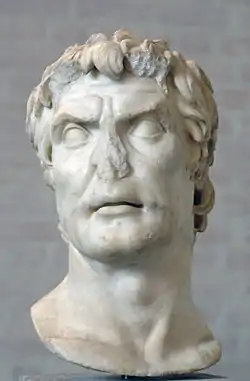Sulla's civil wars
Sulla's civil wars were a series of civil wars in which Lucius Cornelius Sulla, a Roman statesman and general, attempted to take control of the Roman Republic.
| Sulla's civil wars | |||||||
|---|---|---|---|---|---|---|---|
 Bust of Sulla in the Munich Glyptothek. | |||||||
| |||||||
| Belligerents | |||||||
|
|
| ||||||
| Commanders and leaders | |||||||
|
|
| ||||||
Background
The Roman general and longtime consul Gaius Marius had gained great prominence during the 2nd century BC, particularly as a result of his campaign against the rebelling African king Jugurtha.[1] The campaign was successful, and Marius was rewarded with re-election as consul and a triumph. However, to his disappointment, Lucius Cornelius Sulla, one of his officers, was given credit for Jugurtha's capture.[2]
In Asia, Mithradates, king of Pontus, began to attack regions that had been annexed by Rome. He also infiltrated his agents into Roman-held cities, which caused popular uprisings and vicious riots that resulted in the deaths of tens of thousands of Romans.[1] The Roman governors, however, had few soldiers to stop him with, for Rome was embroiled in the Social War against Italian city-states in the south.[1]
Sulla's first civil war
Both Marius and Sulla distinguished themselves commanding legionaries in the Social War, and, when it was concluded, the Senate was forced to choose one of them to command the army that would be sent against Mithradates. In light of Sulla's recent election as consul, the Senate appointed him to the command, and Marius, now nearing seventy, was furious. He appealed to the mob,[1] which turned out in his support and eventually marched on the Senate, threatening to kill Sulla.
Sulla fled, sailing to Greece, where the Mithradatic War veterans had maintained their loyalty to him. The army was transported to Italy, and, with Sulla at its head, marched on Rome. Marius, with a hastily formed army, attempted to defend the city, but, after a few hours of street-fighting,[3] Marius was driven out and Sulla installed as sole Roman ruler.
Sulla sailed across the Mediterranean yet again and pursued the campaign against Mithradates, restoring Roman rule to the eastern provinces.[1]
However, the senators in Rome, now in complete control of the city, turned against Sulla in 87 BC. They invited Marius to return, and he hurried back, beginning a brief period of terror. Marius became so powerful that, if he failed to nod to one who spoke to him, his soldiers would kill the unfortunate man.[1] Marius was an old man, though, and seventeen days into his seventh consulship, he died.
Marius' key ally and supporter, Cinna was left as sole consul. Meanwhile, across the Mediterranean, Sulla ensured the loyalty of his troops and prepared for a second voyage to Rome. The frightened senators attempted to negotiate with him, but Cinna was resolved to fight.[3] He was murdered by mutinous troops, and Sulla broke off negotiations with the Senate.
Sulla's second civil war
Backed by an army of 40,000,[3] Sulla landed at Brundisium in 83 BC. Led by Marius' son, Marian veterans in Rome prepared to fight Sulla. However, by 80 BC, they had been defeated and young Marius had committed suicide.
Sulla was reinstated as Dictator of Rome. At his command, hundreds of Marius' former supporters, along with those regarded as critical of Sulla and his actions, were put to the sword. [1]
After the second civil war, Sulla was not challenged by Marian supporters during the last year of his life, 79 BC. When he died, his allies organized a large funeral, at which his body was cheered by the entire crowd. According to one source, his friends applauded him because of their respect and his enemies because he was dead.[1]
References
- Bailey, Ann Howard, John Bowman, Ormonde de Kay, et al. The Universal History of the World, Vol. III, Ancient Rome. Golden Press, New York 1966
- Marius and Sulla. Yaggyslatin.com. Retrieved on 2010-10-13.
- Marius and Sulla. Janusquirinus.org. Retrieved on 2010-10-13.